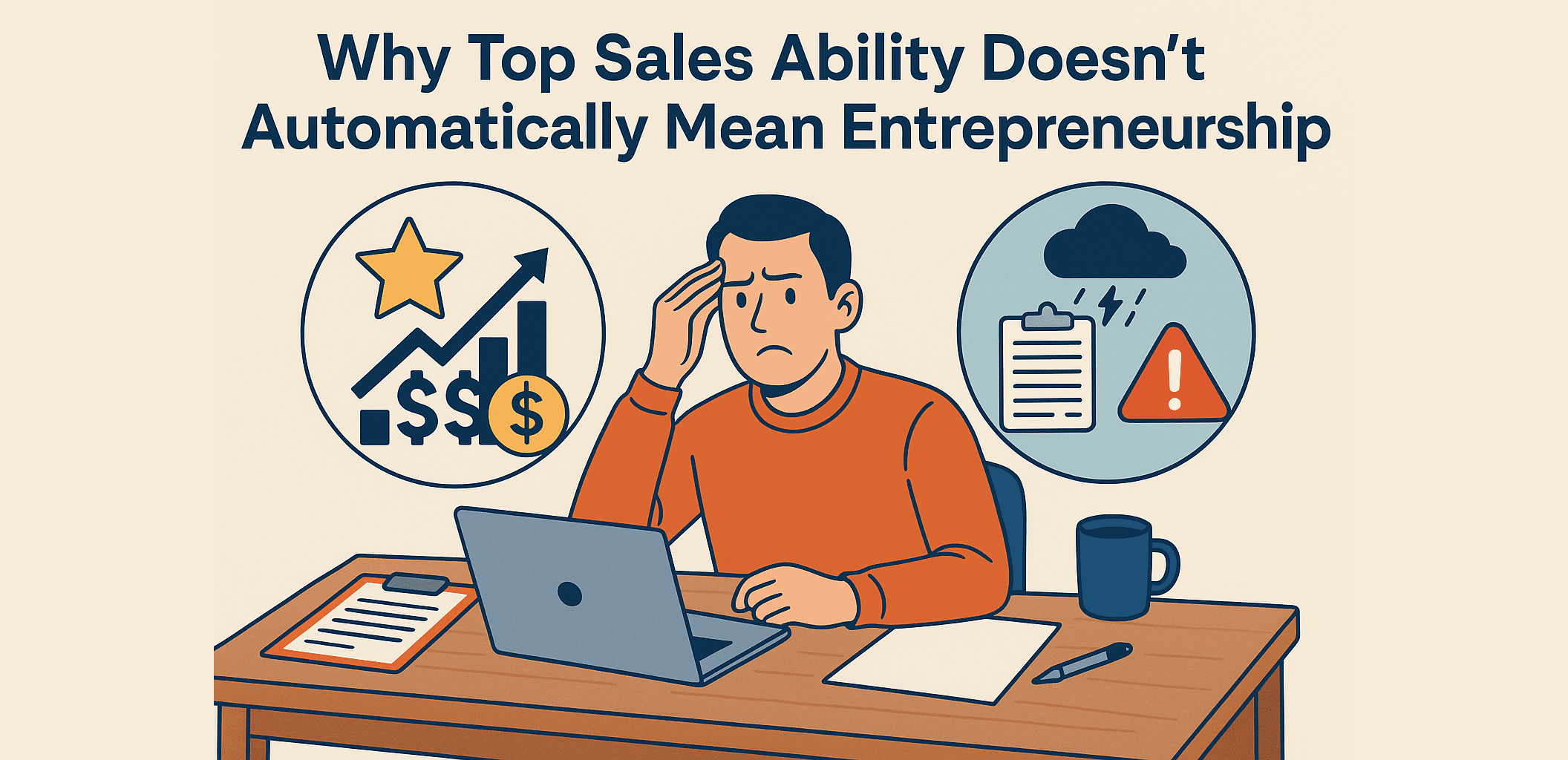Why Top Sales Ability Doesn’t Automatically Mean Entrepreneurship

In every agency, there’s a predictable—and often painful—story.
A top salesperson, riding a wave of commissions and confidence, decides it’s time to “be their own boss.”
They’ve mastered persuasion, built strong client relationships, and led the leaderboard for years. Surely, running their own agency is the next logical step.
It’s a decision that often ends not in freedom, but in frustration. Because being great at sales and being great at business are two entirely different games.
One rewards execution. The other demands structure. One is about momentum. The other is about systems.
Let’s break down why sales success doesn’t automatically translate into entrepreneurship success — and what it truly takes to make that leap.
1. Sales Is About Execution. Business Is About Structure.
A top salesperson thrives on action — prospecting, presenting, closing. Their performance is tied directly to their personal energy and daily hustle.
But a business owner thrives on structure — building a system that works even when they don’t. Entrepreneurship isn’t about how well you sell; it’s about how well your system performs without you.
In sales, you’re the engine.
In business, you build the engine.
If your agency stalls the moment you take a day off, you haven’t built a company — you’ve built a job with overheads.
2. Salespeople Focus on Income. Entrepreneurs Focus on Cash Flow.
A top salesperson celebrates every big commission cheque.
An entrepreneur worries about next month’s payroll.
The difference? Cash flow.
A salesperson’s world is transactional — deal done, profit earned.
An entrepreneur’s world is cyclical — revenue in, expenses out, and the survival of the business depends on what’s left over.
A top salesperson sees profit as what’s left after a deal.
An entrepreneur sees profit as what’s left after paying everyone else — and only if there’s enough left to fund next month’s operations.
That’s the brutal truth of ownership: even when the numbers look good, timing and cash flow can still sink you.
3. Sales Rewards Charisma. Entrepreneurship Rewards Systems.
Sales is personal.
You close deals through trust, charm, and timing.
But a business cannot rely on charisma — it relies on consistency.
Entrepreneurship rewards those who build repeatable systems:
- Clear SOPs
- Transparent commission rules
- Automated workflows
- Financial reporting
- Compliance controls
Charisma may win you clients. But systems win you sustainability.
4. Salespeople Motivate Themselves. Entrepreneurs Must Motivate Others.
Top sales performers are often brilliant individual athletes. They thrive on personal discipline and don’t need a coach to push them.
But entrepreneurship turns you from the star athlete into the coach, owner, and stadium manager — all at once. The game flips completely.
Now your success depends on how well you train, manage, and retain others. And that requires patience, empathy, and structure — not just ambition.
Leadership isn’t about getting people to work like you. It’s about designing a system where average people can succeed consistently.
5. Sales Failures Are Temporary. Business Failures Are Structural.
When a salesperson fails, it’s a bad month.
When a business fails, it’s the end.
A few missed deals can dent your confidence.
But missed payroll, unpaid tax, or breach of compliance can shut your doors.
A salesperson’s risk is personal.
A business owner’s risk is institutional — it lives in contracts, systems, and liabilities.
That’s why successful entrepreneurs obsess over cash buffers, processes, and risk management — not just sales targets.
6. Many Top Sales Eventually Return to What They Do Best
We’ve seen this pattern countless times. A top salesperson leaves to start an agency. At first, it feels liberating. Then come the overheads, the admin, the HR headaches, and the sleepless nights.
Eventually, many return to production — not because they failed, but because they realized what they loved most:
- Selling, not supervising.
- Closing, not managing.
- Freedom, not firefighting.
There’s no shame in that.
Some of the wealthiest agents in Malaysia are career producers, not principals.
Knowing your lane is not weakness — it’s wisdom.
7. The Smarter Path: Partner, Don’t Just “Start”
If you’re a top performer with entrepreneurial ambition, there’s a smarter route: partnership.
Find a licensed structure that gives you:
- Control over your brand
- Transparent ERP and commission tracking
- Shared resources and compliance coverage
- Scalable systems without solo risk
You bring production power. They bring infrastructure. That’s not settling — that’s strategic scaling.
Final Thought
Being a top salesperson means you’ve mastered momentum.
Being an entrepreneur means you’ve mastered structure.
Don’t confuse skill with sustainability.
Don’t mistake production for protection.
If your dream is freedom, build it the right way — with systems, structure, and strategy.
Otherwise, you’re not building a business;
you’re just signing up for a much harder, less profitable job with a more impressive title.











































































































